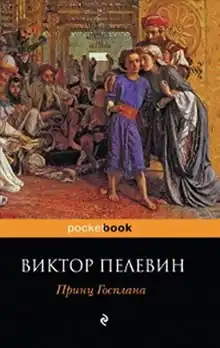Prince of Gosplan
Prince of Gosplan[1] (Russian: «Принц Госплана») is a novella by Victor Pelevin, published in 1991 in Russia.[2][3][4]
 | |
| Author | Victor Pelevin |
|---|---|
| Country | Russia |
| Language | Russian |
| Genre | Novella |
Publication date | 1991 |
| Media type | Print (Paperback) |
| ISBN | 978-5-699-48691-5 |
Plot
The protagonist of the novel is Sasha Lapin, a young specialist who works in the IT department of Gossnab (State Supplies). Along the way he plays one of the most popular games of the time – "Prince of Persia".[5]; his co-workers also play computer games, such as "Abrams Battle Tank". Sasha's boss wants him to get some documents signed at Gosplan (the State Planning Committee), which involves making his way to higher levels of the video game and confronting the game's guardian figures. At one point one of the guards knocks him out but doesn’t kill him, because he happens to be carrying a copy of The Sufi Orders in Islam, by J. Spencer Trimingham, so the guard assumes he must be a spiritual man; they have a conversation about Afghanistan and he tells the guard a long story about a prayer rug. In the end he manages to get the documents signed and starts the game again at Level 1.
Analysis
"Prince of Persia" is one of the first computer games to appear somewhere in the early '90s, with a bookish, romantic plot and movie-like graphics. For the user this game is a real sensation. After all, the screen is no longer a circle eating dots on a black background, but colorful characters: a prince, janissaries with yatagans in turbans and picturesque clothes, a beautiful princess and an evil wizard in a sharp cap and gown. All the characters are perfectly "written out" and move smoothly, like in a classic cartoon like "Snow White". The hero must save the princess by overcoming a complex maze of corridors, traps and defeating all the guards.[6][7] But if you try to imagine the future in terms of the game, each subsequent level is just a more difficult (for the player) version of the previous one.[8] Why then strive forward? Is there an incentive to climb farther and farther? Sasha has that incentive – the princess, which will be a reward for the prince, when he reaches the very end of the game. But in real life, no princess is waiting for Lapin.[9]
In the world of the game, of course, life is much easier. The laws of the game are clear and simple. Not as in the real world, where everything is so confusing that even a lifetime to figure it out. Maybe it is because of the clarity of the game world is so attractive to humans that they are willing to easily swap it for the real world.[10][11] At the end, the main character will have to answer the questions. Who is he really an employee of the Gossnab or a prince? Does the princess exist and is it possible to get to her? Where is reality and where is only fiction? What is in fact the real world?[12][13][6]
References
- Translated by Andrew Bromfield in A Werewolf Problem in Central Russia and Other Stories (New Directions, 1998).
- "Prince of Central Planning". www.popuw.com. Retrieved 9 February 2021.
- "Vladimir Vasilyev: Cyberpunk for Russians and non-Russians: Article". www.rusf.ru. Retrieved 9 February 2021.
- "Literature on the Margins: Russian Fiction in the Nineties".
- Андреевич, Катаев Филипп (2011). "Семантика и функции компьютерного дискурса в прозе Виктора Пелевина". Вестник Пермского университета. Российская и зарубежная филология (2). ISSN 2073-6681.
- Виктор Пелевин "Принц Госплана" (in Russian).
- "Виктор Пелевин – Принц Госплана (Серый Критик) / Проза.ру". proza.ru. Retrieved 9 February 2021.
- "Фрактальная логика Виктора Пелевина". Вопросы литературы (in Russian). Retrieved 9 February 2021.
- Хромов, Алексей (10 December 2017). "Буддийский киберпанк: игры и виртуальность в творчестве Виктора Пелевина — Офтоп на DTF". DTF. Retrieved 9 February 2021.
- "Ксения Макеева "Творчество Виктора Пелевина" / Статьи / Виктор Пелевин :: сайт творчества". pelevin.nov.ru. Retrieved 9 February 2021.
- "Виктор Пелевин "Синий фонарь", 1993 год". tvrain.ru. 21 October 2017. Retrieved 9 February 2021.
- Алексей (27 May 2015). "Критика. Загадки И Отгадки Виктора Пе6левина". Литературная Россия. Retrieved 9 February 2021.
- Gritsenko, Daria (15 December 2020). The Palgrave Handbook of Digital Russia Studies. Springer Nature. ISBN 978-3-030-42855-6.